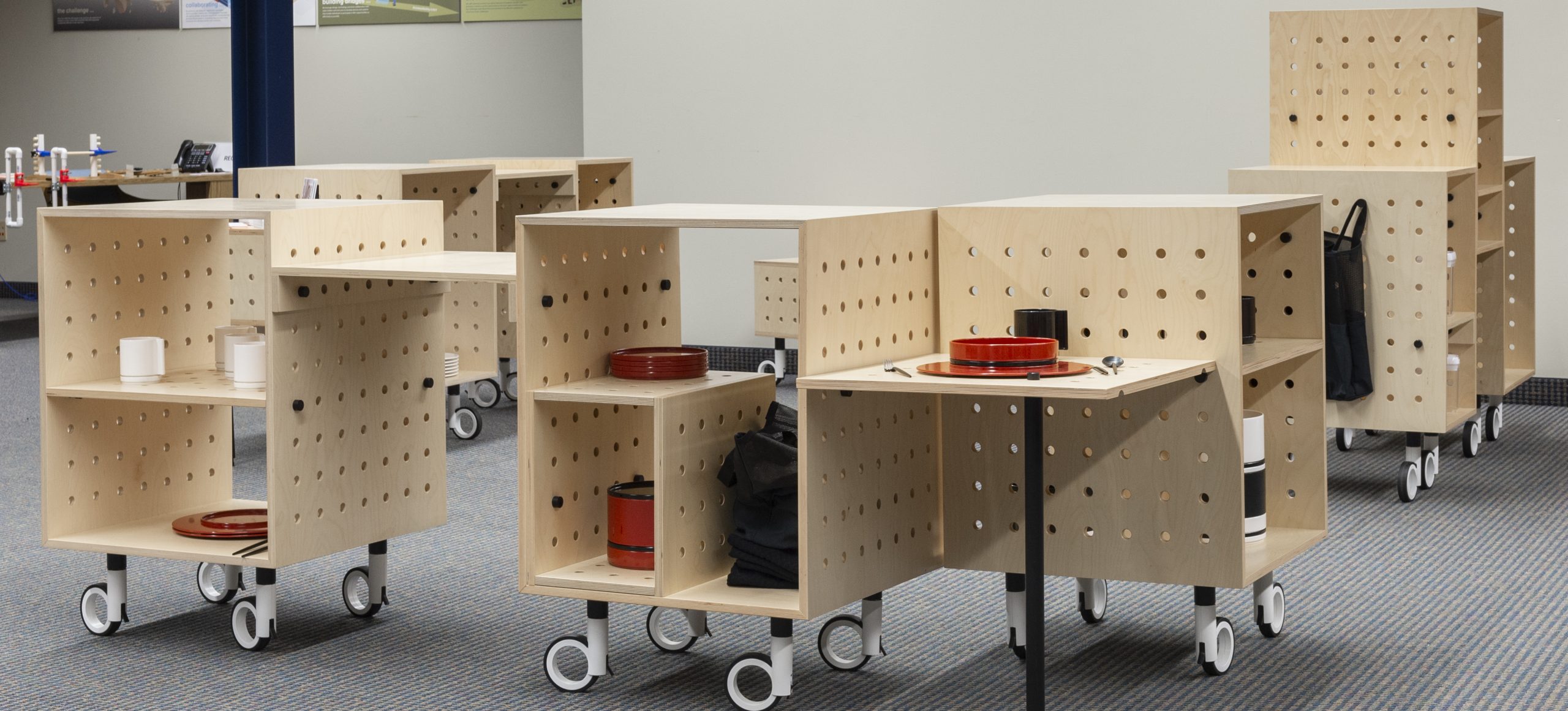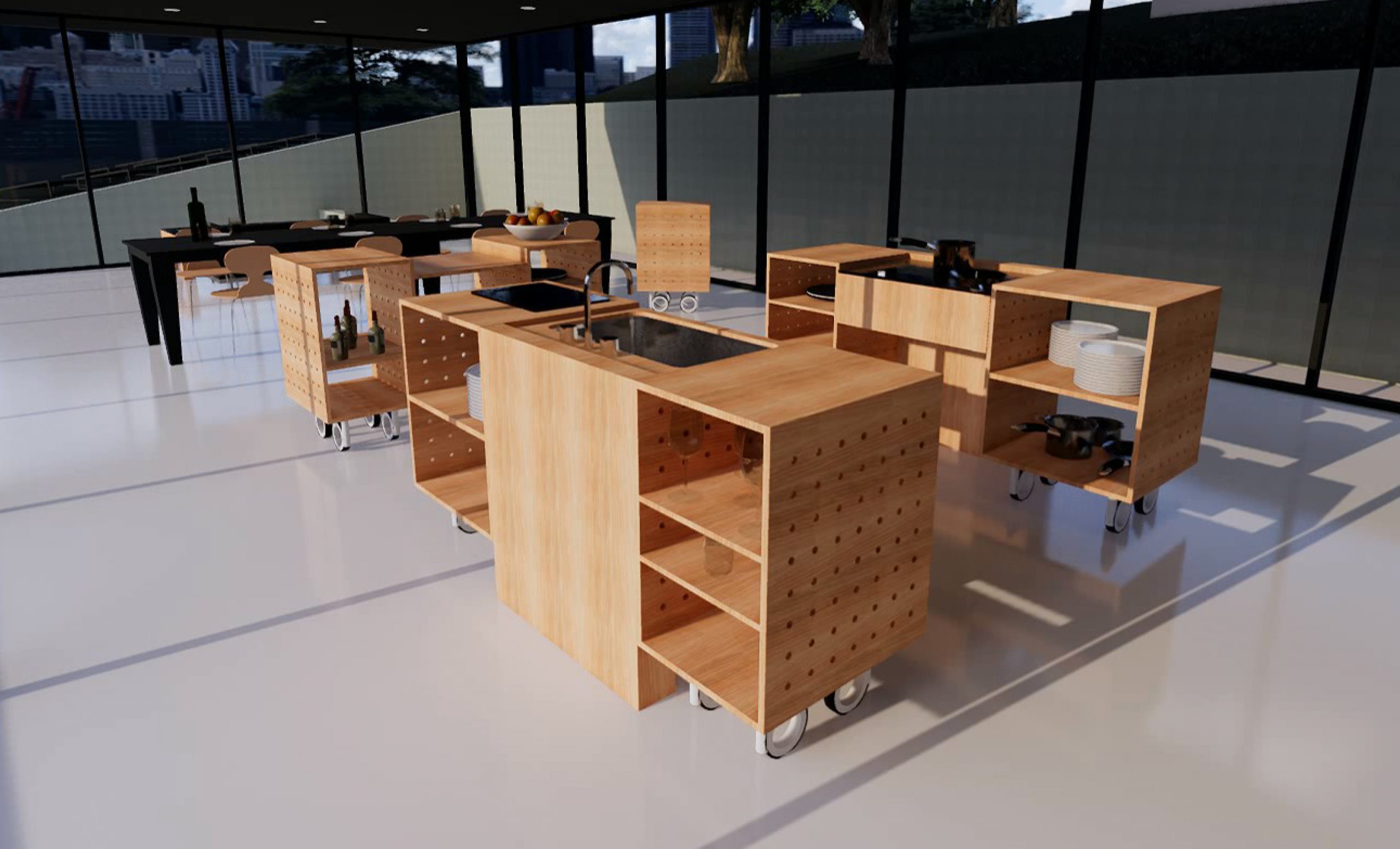Research
Research
MO:KI is a bespoke collection of modular units that push the boundary of the cooking experience and traditional work triangle by improving accessibility. The modules highlight work zones for cooking, cleaning, and preparation, demonstrating universality and flexibility for improved user experience. The multifunctional MO:KI system is interchangeable and includes “point of use” appliances to maximize efficiency. The plug-and-play approach, a grid with custom pegs, provides endless options for reconfiguring hard and soft storage solutions with varied height work surfaces. Set on casters, the units mobilize to fluidly reset the cooking environment. The prototypes are in research and development in anticipation of future production.
Our design is original and innovative
MO:KI breaks away from the confines of decades-old thinking that the kitchen work triangle must be satisfied. Designed from the tactile experience of the chef outward the units, set on casters, respond to changing programmatic needs.
While other modular kitchens exist, MO:KI offers endless flexibility. This highly mobile system uniquely shifts from multifunctional cooking spaces to entertainment venues. MO:KI’s inherent human-centeredness readily adapts to support physical and social needs while creating an engaging user experience.
Our design captivates people
MO:KI is both whimsical and serious, it is designed to restore the enjoyment of cooking through ease of use and socialization. The openness of the free-standing units appeals to the social chef.
MO:KI’s flexibility and interchangeable nature encourage personal interaction while cooking from both sides of the units. Ergonomically, the two-sided units shorten reach atop and within storage systems to accommodate users of any age, ability, and stature. The reconfigurability empowers people to organize their own cooking experience.
The modern, sleek form is timeless in sensibility and can be translated into many materials and colors. MO:KI is for everyone, it is an “investment collection” that can be taken with the owner, like furniture, from home to home.
Projects

The MO:KI prototypes are currently in research and development at the RIT LiveAbility Lab at the Al Sigl Community of Agencies’ Wolk Campus in Rochester, New York.
PI:
Mary Golden
CoPI:
William Tracey
Dr. Dan Phillips, AccessAbility Lab
Undergraduate Researchers
Emma Canny (INDE)
Thomas Richter (INDE)
Jimmy Antonelli (ID)
Contributors/Advisors: Simone Center for Applied Entrepreneurship
Collaborators: Autodesk, BaceBuild, Nexis3, Waldron Rise Foundation, Al Sigl Community Partners
Design thinking is grounded in anecdotal feedback from retail clients. Our evidence-based design research and pilot experiential activities provided tactile insight into the social engagement and nuances of preparing a meal. Evidence confirms that MO:KI is a feasible concept for improving physical and behavioral health. Hence, the central hypothesis is that MO:KI will transform the cooking experience of people by enhancing the efficiency of the environment and improving social connectedness in the kitchen.
Early data from our customer discovery research identified and expanded a viable customer base. Our ongoing customer discovery provides deeper insight into user demographics and identifies product adjustments. To further test our hypothesis, we are performing a series of research studies that allow users to interact with the units in controlled environments. In addition, interviews and surveys gather feedback from participants related to social connectedness and independence. After analyzing our initial prototyped units, we will further investigate materiality, appliance systems integration and perform engineering tests while completing a cost analysis for outsourcing fabrication.
The Right Idea At The Right Time
The current elderly population (ages of 65 and up) is 17% of the total population1 and 25.9% of that population lives alone in their own home2. Statistically the older the age, the more likely people are to live alone. According to the 2016 U.S. Census Bureau, about 1 out of 5 adults 65 to 74 years old lived alone, but that figure doubled to around 4 out of 10 among those 85 and older2. Unfortunately, challenges to mobility in the built environment may be a constant reminder or an unwanted consciousness of one’s impaired or deteriorated body3. MO:KI allows for the increasingly solitary aging populations to personalize their kitchen environments to suit their needs and gain social independence with improved mobility and functionality.
Citations:
- Ortman J, Velkoff V, Hogan H. An Aging Nation: The Older Population in the United States, Population Estimates and Projections. U.S. Census Bureau. May 2014. Report Number P25-1140.
- Roberts, A. Ogunwole, S. Blakeslee, L. Rabe, M. The Population 65 Year and Older in the United States: 2016. U.S. Census Bureau. Oct. 2018. ACS-38.
- Imrie, R. Disability and Discourses of Mobility and Movement, Environment and Planning A. 2000; 32(9):1641-1656.
Sponsors
Non-endowed funds, educational gifts, and sponsorship from alumni, family foundations and corporate partners were dedicated to multidisciplinary faculty-student research for student-faculty-based research activities for the MO: KI prototypes and exhibition at the 2019 ICFF University Showcase
Charles and Millicent Brown Foundation (Awarded from Effective Access Technology)
Awarded, January 2019 for MO:KI materials and project expenses
Principal Investigator, Mary Golden
Administered by RIT faculty leader of the Partnership for Access Technologies, Dr. Dan Phillips. Proposal reviewed and approved by donors Charles and Millicent Brown
Herman Miller (Gift | Donation)
Awarded, March 2019 for ICFF Units of Memory: Foodease installation
Autodesk Project Support Funding (Gift | Donation)
Awarded, April 2019 for MO:KI project expenses
Patent
Golden, M., Tracey, W., Antonelli, J., Canny, E., Richter, T., Rojas, R., Fugle, L., Avis, W., Balcerzak, L., Fliegel, R., Giancola, H., Pedrotti, C., “MO:KI,” United States Patent, No. 0000000 (Pending)
Conference Presentations and Proceedings
- Golden, Mary. “Creating Units of Memory: From University Design Studio to Manufacturer Using Fusion 360.” Autodesk University, Industry Talk
